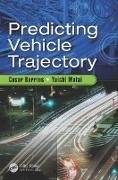Current vehicular systems are mostly based on line of sight sensors used to prevent a collision. The book concentrates on improving the prediction of a vehicle's future trajectory, particularly on non-straight paths, by having an accurate prediction of where the vehicle is heading. This is crucial for the system to reliably determine possible path intersections of more than one vehicle at the same time. The authors evaluate the use of smartphones' built-in sensors to predict a vehicle's trajectory as a possible intermediate solution for a V2V and V2I communication, until all vehicles have all the necessary sensors and communication infrastructure to fully populate this system.


